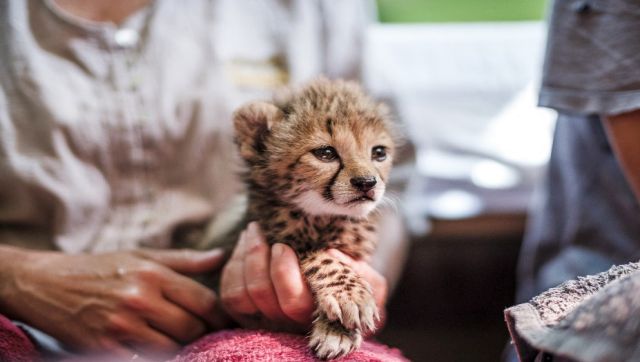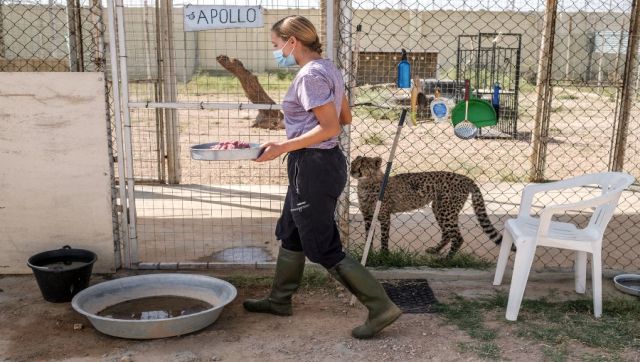Saving cheetahs from going extinct, one cub at a time
A century ago, there were roughly 100,000 wild cats worldwide. Today barely 7,000 remain, as illegal pet trade continues to wreak havoc on the species
)
The fastest animal on land may not be quick enough to outrace extinction. A century ago, there were an estimated 100,000 cheetahs worldwide. Today barely 7,000 remain, their numbers slashed by human encroachment and habitat destruction. However, the Cheetah Conservation Fund, a non-profit organisation in Somaliland, is trying to protect the cheetah and stop the trafficking of cubs, which are shipped out of Africa to war-torn Yemen and onward to Gulf where they fetch up to $15,000 on the black market. AFP
)
More than 3,600 live cheetahs were illegally traded worldwide in the decade to December 2019, according to research published this year. According to Cheetah Conservation Fund, around half the cubs saved from traffickers do not survive the trauma. Gulf states, the main buyer market where cheetahs are still coveted status symbols. Laurie Marker, founder of the Cheetah Conservation Fund and a leading authority on cheetahs, was quoted as telling AFP that “if this keeps going… that kind of offtake causes the population to go extinct in a very short time”. AFP
)
Combatting this criminal trade is particularly challenging because it revolves around Somaliland, a self-declared republic without international recognition, and one of the world’s poorest regions. Roughly the size of Syria, the breakaway region between Ethiopia, Djibouti and Somalia is stretched thin policing its porous borders. Cubs that get trafficked face horrible treatment along the smuggling route: fed improperly and confined to tiny cages, sometimes with their legs bound with zip ties. From just a handful of cubs in 2018, today CCF shelters 67 rescued cheetahs across three safe houses in the Somaliland capital Hargeisa. AFP
)
The smuggling of cheetah cubs is a busy trade, one less familiar than criminal markets for elephant ivory or rhino horn, but equally devastating for Africa’s most endangered big cat. AFP
)
In addition to bringing cheetahs to the safe house, CCF works to mitigate the animal’s decline by restoring habitat, conducting scientific research, and reducing conflicts with humans. Part of the campaign to stop the modern-day trade has focused on changing attitudes in prosperous Gulf states, the main buyer market, where cheetahs are still coveted status symbols. Marker said wealthy owners liked to show off their cheetahs in selfies as much as their cars and cash. AFP
)
Ahmed Yusuuf Ibrahim, a local veterinarian, has learnt how to nurse sickly cubs back to health and has developed a close fondness for the cheetahs under his care. Ibrahim is a doting custodian – right down to making sure cheetahs young and old get their fair share of camel meat. “I care for them. I feed them, I clean them. They are my babies,” he was quoted as saying. AFP
)
After years of pressure from animal welfare groups, the United Arab Emirates banned the owning, trading, and breeding of cheetahs and other big cats in 2017. Also, laws criminalising the sale of cheetahs have also started being enforced; in October 2020, a smuggling ring was shattered and a high-profile trafficker prosecuted in a landmark trial. AFP
)
In the period between July-September, India too announced that they were working on bringing the wild cat from South Africa to the Kuno National Park in Madhya Pradesh. The move comes 74 years after the last of the big cats was killed in India. The cheetah was declared extinct in the country in 1952. The International Union for Conservation of Nature lists the Asiatic Cheetah to be critically endangered. AFP


)
)
)
)
)
)
)
)



